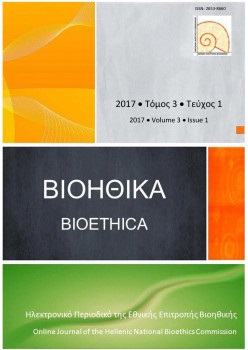Testing the limits of Bioethics: the case of DTC Genetic Testing
Abstract
Direct-To-Consumer (DTC) genetic tests are commercial services provided online, in drugstores and/or via television and press devoid of the consultation by a health professional or geneticist. Today, there are issues regarding their data validity and interpretation and the ethics of their use, as they allow access to the users’ genetic makeup.
Indeed, DTC genetic services can influence consumers’ private life as well as the lives of those around them. We feel that DTC genetic tests and services need to be regulated and notably, regulation measures should be standardized among national and multinational regulatory bodies.
Article Details
- How to Cite
-
Ζέρβα (Sophia Zerva) Σ., Λαχανά (Olympiada Lachana) Ο., Μπουραζάνη (Eleni Mpourazani) Ε., Παπουτσάκη (Eleftheria Papoutsaki) Ε., Πετρόπουλος (Konstantinos Petropoulos) Κ., Χριστοφίδη (Mairy Christophidi) Μ., Κάτσιλα (Theodora Katsila) Θ., & Πατρινός (Giorgos Patrinos) Γ. (2017). Testing the limits of Bioethics: the case of DTC Genetic Testing. Bioethica, 3(1), 5–14. https://doi.org/10.12681/bioeth.19862
- Section
- Original Articles
Authors who publish with this journal agree to the following terms:
- Authors retain copyright and grant the journal right of first publication with the work simultaneously licensed under a Creative Commons Attribution CC BY 4.0 License, which allows for immediate free access to the work and permits any user to read, download, copy, distribute, print, search, or link to the full texts of articles, crawl them for indexing, pass them as data to software, or use them for any other lawful purpose. Appropriate credit must be given by citing the author(s) and the original publication in this journal.
- Authors are able to enter into separate, additional contractual arrangements for the non-exclusive distribution of the journal's published version of the work (e.g. post it to an institutional repository or publish it in a book), with an acknowledgement of its initial publication in this journal.
We encourage authors to deposit their articles, as well as data underlying the publications, in institutional and/or other appropriate subject repositories.
Bioethica permits and encourages authors to archive the final publication pdf in institutional (e.g. the repository of the National Hellenic Research Foundation) or other appropriate subject repositories (e.g. SSOAR repository for social sciences), in compliance with institutional and/or funder open access policies, after publication in the BIOETHICA. Authors must provide bibliographic details that credit publication in the journal, as well as related funding details (when applicable).
Lists of institutional and other subject-based academic open access repositories can be found listed by country at the registry http://opendoar.org/countrylist.php
If your institution does not possess a repository you may deposit a copy of your paper at no cost with www.zenodo.org , the repository supported for open access research in the EU by the European Commission, through the project OpenAIRE (www.openaire.eu )



